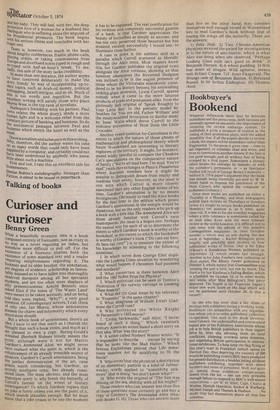Bookbuyer's
Bookend
Whatever differeaces there may be between publishers and the press corps, both factions are generally agreed on one point: the importance of retaining the review embargo system. To publishers it gives a measure of control in the timing of their promotion ploys, with the added possibility that, if all the papers decide to review a book, the impact will be immediate rather than fragmented. To the press it gives time — time to get organised, to consider, read and write, and even to commission another review if the first is not good enough, and all without fear of being scooped by a rival paper. Sometimes a literary editor breaks the embargo by mistake, or with the publisher's permission, or — as Spectator readers will recall of George Brown's memoirs — without it. (This paper's argument that the book was already being cheerfully pre-sold by W. H. Smith failed to impress the gentlemen of the Press Council who upheld the complaint of publishers Gollancz.)
Since most books are published on either a Thursday or a Monday, and most newspapers publish book reviews on Thursdays or Sundays (when it's alright to review books published on Mondays) the position is, as it were, quite clear-cut. It is less so for the monthly magazines where a little tolerance is sometimes called for on both sides. Even with the most tolerant review in the world however, it is difficult not to take issue with the editors of this month's Cosmopolitan magazine. In their October number — which was on sale during the last week in September — Rachel Billington gives lengthy and generally kind reviews to four substantial works of fiction. One is for Edna O'Brien's A Scandalous Woman, published on September 12, which seems fair enough. Another is for John Fowles's new collection of short stories The Ebony Tower, published on October 3, which means that Cosmopolitan was jumping the gun a little, but not by much. The third is for Sue Kaufman's Falling Bodies, which is scheduled for October 10, or in other words two weeks after Miss Billington's first piece appeared. The fourth is for Francoise Sagan's major new work Scars on the Soul which will not be published until October 24. Is this a record?
As one who has more than a fair share of dealings with publishers during a working week, Bookbuyer can sympathise with any organisation whose job is to enlist publishers' collective co-operation. One such is the Book Development Council, the understaffed and overworked export arm of the Publishers Association whose job is to help British publishers in their export drive by, inter alia, advising them on local conditions, planning overseas sales missions, and organising British participation in international exhibitions. To help keep the flag flying at this year's mart in Frankfurt (which opens on
Election Day, thus depriving the country of 500 would-be publishing voters) BDC have produced for general distribution a booklet listing all those publishers exhibiting, together with stand numbers and name of personnel. Well, not quite all. Among those exhibitors conspicuously absent from the list — one can only presume through failure to respond to BDC's well-meant exhortations — are W. H. Allen, Cape, Chatto & Windus, Hamish Hamilton, Seeker & Warburg, Michael Joseph and Thames & Hudson. . . . No doubt they feel themselves above all that fine nonsense.
































 Previous page
Previous page